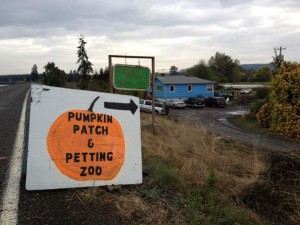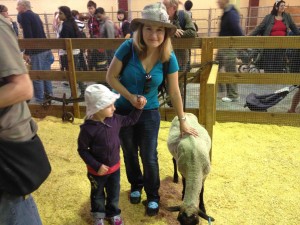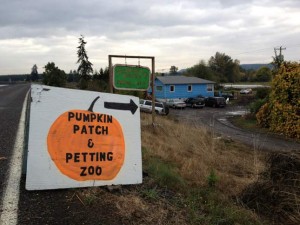In the fall of 2009, an E. coli O157:H7 outbreak at Godstone Petting Farm in the U.K resulted in 93 illnesses – primarily little kids.
An initial report by Professor George Griffin found that it could have been avoided if visitors had been kept away from animal feces, and was made worse by the slow  reaction of health authorities before the petting farm in Surrey was closed.
reaction of health authorities before the petting farm in Surrey was closed.
Eight of the children infected required dialysis and some have been left with permanent kidney damage. At one point during the outbreak victims were occupying all the children’s acute renal support services in London.
As part of the response, U.K. health types recommended handwashing stations with soap and water only (no wipes or sanitizers).
But while some studies suggest inadequate handwashing facilities may have contributed to disease outbreaks, or washing hands was protective against illness, others suggest bugs like E. coli O157 may be aerosolized and inhaled, thus not prevented with handwashing.
In the 2009 outbreak, a bunch of U.K. researchers concluded that in the Godstone outbreak, “handwashing conferred no demonstrable protective effect.
“Moreover, from the findings of many previous published studies, it must be assumed that all petting or open farms are potentially high-risk environments for the acquisition of VTEC O157 infection.”
The Dispatch in North Carolina sorta realizes this when it writes in an editorial, “petting zoos at agricultural fairs have caused too much pain and sorrow for too many youngsters and their families in this state (North Carolina). Unless and until there’s a completely reliable method of assuring that no young child will contract E. coli-related  illnesses at fairs’ petting zoos, the operations, popular as they are, should be prohibited.”
illnesses at fairs’ petting zoos, the operations, popular as they are, should be prohibited.”
Lynne Terry of The Oregonian writes regarding an outbreak of E. coli that has sickened at least 10 people and shuttered a petting zoo and pumpkin patch in Longview, Wash. after 28 years of business.
“We voluntarily shut down and have not reopened,” said Ruth McKee, co-owner of Willow Grove Gardens Pumpkin Patch. “Nobody wants children hurt.”
In recent decades, health officials across the country have tied dozens of outbreaks to petting zoos, rodeos and county fairs, said William Keene, senior epidemiologist at Oregon Public Health.
Oregon alone has seen five outbreaks traced to fairs or rodeos since 1990, he said, including three linked to Clackamas County Fair in 2003, 2006 and 2007. The biggest was in 2002 when about 80 people were sickened by E. coli O157:H7 after walking through animal exhibits at Lane County Fair.
“If you go visit the goats and sheep at the county fair, it’s like going back in a miniature way to the farm — and that brings a little bit of the farm risk to your doorstep,” Keene said.
Farm animals shed harmful bacteria in their feces, which can spread to dirt, railings, soles of shoes and hides.
Lab tests confirmed five illnesses — four children were infected by E. coli O157:H7 and one child contracted another harmful strain, O121. Five other people, mostly children, suffered gastro-intestinal symptoms after visiting the farm. Those sickened included two children and an adult from Oregon.
Just last month, a 2-year-old boy died in North Carolina in an E. coli O157 outbreak traced to a petting zoo at a county fair. Health officials were stunned by the final toll:  106 sickened, 11 hospitalized and seven with kidney failure.
106 sickened, 11 hospitalized and seven with kidney failure.
Carl Williams, state public health veterinarian in North Carolina, said bacteria were found around the petting zoo but also in other areas. Officials even found E. coli O157 in a parking lot separated from the petting zoo by a chain-link fence and a two-lane asphalt road.
The only state with petting zoo regulations as stringent as North Carolina’s is Pennsylvania, according to Benjamin Chapman, associate professor of food safety at North Carolina State University.
Washington state requires hand-washing stations and signs near animal exhibits, but petting zoos do not have to undergo inspections or obtain permits. Oregon regulations don’t address the issue.
Even with rules, it’s impossible to eliminate all risk of contamination, said Doug Powell, food safety professor at Kansas State University. But he said well-designed exhibits can reduce the threat.
Powell said petting zoos and animal exhibits should have one entrance, allowing visitors to flow through to a hand-washing station at the exit staffed with employees encouraging their use. He also recommends barriers, keeping the animal areas and bedding as clean as possible, and not allowing eating or smoking.
“You have to be a lot more careful than you ever thought you had to be,” Powell said.
A table of petting zoo outbreaks is available at http://bites.ksu.edu/petting-zoos-outbreaks.




